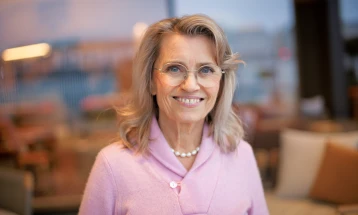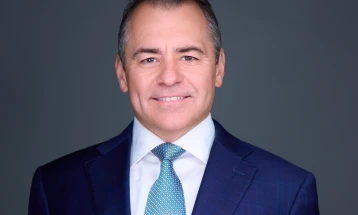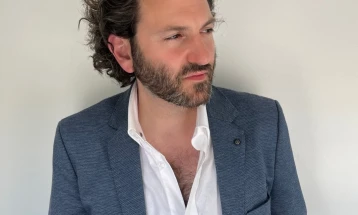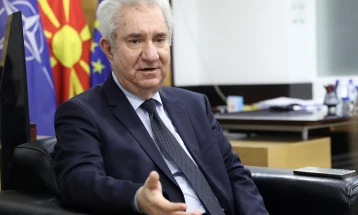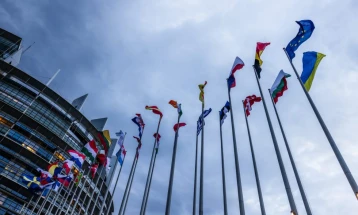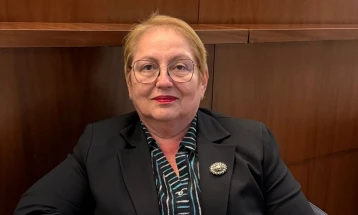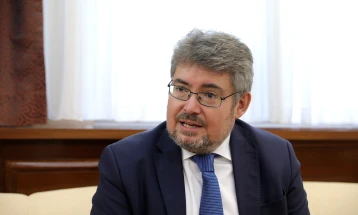Western Balkans still knocking on Europe’s door
- The EU has again reaffirmed its full commitment to the accession prospects of the Western Balkans. The geostrategic environment with Russia’s war in Ukraine and the crisis in the Middle East threatens global security, emphasising the importance of the Western Balkans for the EU.
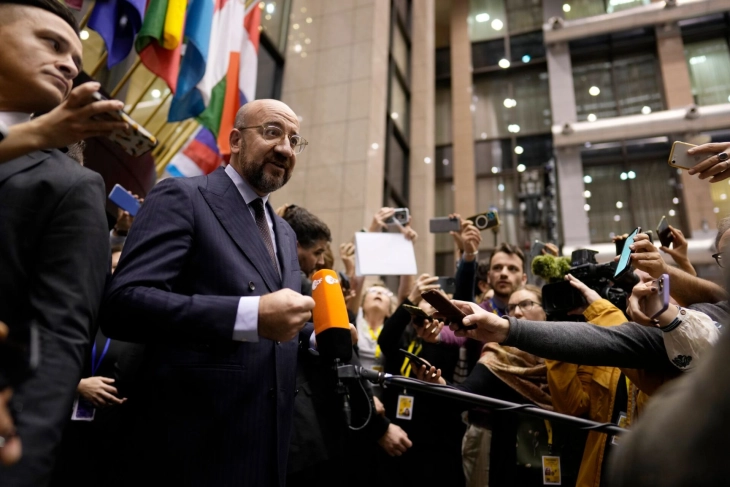
17 December 2023
enr - Brussels
The EU has again reaffirmed its full commitment to the accession prospects of the Western Balkans. The geostrategic environment with Russia’s war in Ukraine and the crisis in the Middle East threatens global security, emphasising the importance of the Western Balkans for the EU.
EU and Western Balkan leaders met in Brussels on December 13, one year after the Tirana summit in 2022. The summit aimed at bringing the Western Balkans closer to the EU by driving forward political integration, laying a future economic foundation and mitigating the impact of Russia’s war in Ukraine.
The President of the European Parliament, Roberta Metsola, said on Wednesday that, compared to previous years, for the first time there was an understanding among EU member states to prepare for enlargement. Metsola also recalled that the European Commission recommended the conditional opening of accession negotiations with Bosnia and Herzegovina (BiH).
At the summit on December 14, the European leaders decided to open accession talks with Ukraine and Moldova, approved candidate status for Georgia, and to open negotiations with “Bosnia and Herzegovina once the necessary degree of compliance with the membership criteria is reached and has invited the commission to report by March with a view to taking such a decision,” European Council President Charles Michel announced on the platform X, formerly known as Twitter.
On Wednesday, he stated that the Western Balkan countries should complete further reforms before being welcomed into the European Union. “We are expecting from them more reforms, especially in the field of rule of law, in the field of the independence of justice.” He added however that there is “strong political determination” in the region to carry out the needed reforms.
Golob: ‘Enlargement must be seen in geopolitical terms’
Slovenia has long been a staunch supporter of Bosnia-Herzegovina’s accession to the EU and Slovenian Prime Minister Robert Golob said the country should be treated in the same package as Ukraine and Moldova. Ahead of Wednesday’s summit, Golob called on EU leaders to bear geopolitics in mind and demanded a package treatment of EU candidate countries. “The issue of enlargement must be seen in geopolitical terms and [the countries must be] treated as a package wherever possible,” he said.
Golob made a stop in Paris en route to Brussels for talks with President Emmanuel Macron. Asked whether Macron supported Slovenia’s initiative that Bosnia should be granted candidate status now, he said it was up to Macron to answer that. “In principle, however, we have the same position on that,” Golob said.
Slovenia is part of the so-called group of ‘Friends of Western Balkans’, with Austria, Croatia, Czech Republic, Greece, Italy and Slovakia, who call for stronger signals to the region.
On Thursday, Croatian Prime Minister Andrej Plenković said that Bosnia and Herzegovina has been sent a strong political signal and a clear time frame to open accession negotiations in March next year. Plenković added that this is an excellent incentive for BiH’s Council of Ministers, led by Charwoman Borjna Krišta, with whom he was in contact all day, to take several more important steps in the next two months in fulfilling the required criteria.
EU leaders made the decision unexpectedly quickly after Hungarian Prime Minister Viktor Orbán waived his veto by abstaining, that is, he left the room during the vote.
Italy wanted a signal on Bosnia and Herzegovina
The decision to open negotiations with BiH once the necessary membership criteria are fulfilled was also strongly advocated by Italy. Ahead of the summit, Italy has demanded that a “clear signal” must be given to BiH. For Rome, it was not sufficient to state in the declaration that “the EU is ready” to open negotiations with Sarajevo.
Meanwhile, the General Affairs Council welcomed in the conclusions the reform efforts undertaken by BiH after the granting of candidate status in December 2022. It was emphasised that some important steps and commitments have been made towards the fulfillment of key priorities, despite the negative developments in the Republika Srpska entity. Also, as stated, the Council encouraged further progress needed in reforms and stressed the importance of ensuring full compliance of all adopted laws with the acquis of the EU and European standards.
Chairman of the BiH Presidency Željko Komšić, addressing the summit in Brussels, said that the fulfillment of 14 key priorities from the Opinion of the European Commission from May 2019 is essential for the further progress of BiH.
More countries in the waiting line
The rest of the neighbouring countries – Albania, Kosovo, Montenegro, North Macedonia and Serbia – have ambitions to join the EU as well, but are faced with lengthy and meticulous accession procedures.
Montenegro, considered the frontrunner, started talks in 2012, followed by Serbia in 2014. Both countries, however, are far from fully aligning their laws and standards with EU norms.
Albania and North Macedonia opened accession talks last year, more than a decade after having applied for membership.
Kosovo’s case is hindered by the fact that five EU countries have not recognised its independence after Kosovo broke away from Serbia in 2008.
North-Macedonian Prime Minister Dimitar Kovačevski said that North Macedonia has completed the screening process, which has been validated by the EU, but “we all know there is one more task we have to complete”. North Macedonia still has to change its constitution to solve the long-standing issue with neighbouring Bulgaria, by adding a reference to the existence of an ethnic Bulgarian minority. He added that “the draft conclusions are very clear and we will certainly move forward with the reforms, whereas the process of constitutional amendments is inevitable,” he said ahead of the EU-Western Balkans summit in Brussels on Wednesday. “It is now up to us but the discussion will continue, for sure,” Kovačevski concluded.
The Bulgarian Prime Minister Nikolay Denkov said earlier regarding North Macedonia’s accession to the EU that Bulgaria supports EU enlargement in the Western Balkans but has so far vetoed North Macedonia’s accession over historical, cultural and language disputes. Sofia has set a requirement from Skopje to implement the Treaty of Friendship, Good-Neighbourliness and Cooperation between the two countries and adopt constitutional changes which will include Bulgarians in North Macedonia’s Constitution. The amendments drafted by North Macedonia’s government have been widely debated but not yet adopted in parliament.
Serbia agrees with the declaration, opposes sanctions on Russia
“It’s good that we have the EU-Western Balkans summit because, in addition to the European political community, it’s a new format in which we from the Western Balkans can always talk openly, honestly and completely transparently with EU leaders,” Serbian Prime Minister Ana Brnabić told reporters.
European Council President Charles Michel urged the Western Balkan countries to fully align with the EU Foreign and Security Policy. He also referred to the application of sanctions, since Serbia refuses to adopt those imposed on Russia by the invasion of Ukraine, despite being a candidate for accession. Brnabić said that, regarding the EU values, Serbia agreed with the EU declaration. Yet when it comes to sanctions against Russia, she said that the Serbian people are against the introduction of any kind of sanctions “because we suffered from sanctions during the 1990s. We think that sanctions always endanger the most vulnerable among the population”, Brnabić concluded.
Borrell: ‘Deliver promises, avoid frustration’
EU foreign affairs chief Josep Borrell deplored the slow progress of accession procedures.
“What we have to do is to deliver on our promises and avoid frustration and fulfill the expectation that has been created,” he said.
“Accession negotiations are one part of our effort to bring the Western Balkans closer, but the other part is to look at the economy,” said European Commission President Ursula von der Leyen after the meeting. “If you look at the Western Balkan economies, they stand today at around 35 percent of the EU average. In other words, there’s a lot of untapped potential,” she said.
“Whether, for example, a solar photovoltaic power plant in Albania or a railway in Montenegro. These are the projects we are pushing forward,” von der Leyen said. “And finally, young people, the most precious part of our lives. In October, we were happy and honored to open the local office of the College of Europe in Tirana. I can report that by now 500 students have already applied to come and study there next year. The European Union will finance 15 scholarships,” said von der Leyen.
Economic cooperation and targeted investments in infrastructure like roads, railways, internet and electricity networks are to boost the region’s economies. The commission announced a new 680 million Euro investment package for projects in rail transport and renewable energy in the Western Balkans.
While the countries are still waiting to become EU members, people and businesses should “feel as soon as possible the positive effects of this engagement with the EU”, Michel said.
The EU would like to encourage “more investments” and “more economic development”, he said.
A proposed fund worth up to 6 billion Euro however is caught up in an EU internal debate on the revision of the bloc’s joint budget.
This article is published weekly. The content is based on news by agencies participating in the enr.
